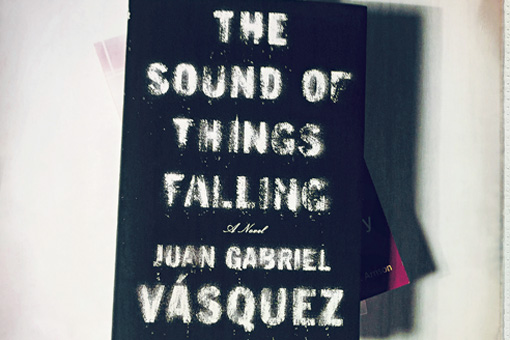The 1993 death of the drug-cartel kingpin Pablo Escobar ended the bloodiest chapter in Colombia’s modern history, allowing the country—a decade later—to begin a process of collective catharsis.
This catharsis first became clear on Colombian television. Once dominated by romantic melodramas, the industry began producing realistic “narco-series” that portrayed the violent and glamorous life of the narcos, with their bloody battles, yachts and country homes, and their ladies addicted to plastic surgery. Although generally crude, the narco-series were popular. They fulfilled Colombians’ need to understand how a country so marginal had produced a multinational mafia with enough power to besiege a state.
In contrast, Colombian literature has produced few works that provide the same exercise in understanding and healing. The Sound of Things Falling, by Juan Gabriel Vásquez, however, should be high on every reader’s list. Vásquez gives voice to a generation that entered adulthood amid the rubble of the bombs planted by drug traffickers. In the 1980s, war was part of daily life and, as one character in the book remembers, Colombians lived every day “with the possibility that people close to us might be killed, always having to reassure our loved ones so they don’t think we are among the dead.” Although the book is set in 1996, it covers the beginnings of the drug trade in the 1960s through the early 1990s, when Escobar held the country in a bloody grip.
The lead character, Antonio Yammara, is a young lawyer who spends his mornings teaching law to first-year university students, and his evenings playing billiards at a café bar in the faded and historic Bogotá neighborhood of La Candelaria. He starts a conversation with Ricardo Laverde, a shadowy former pilot weighed down by his own past involvement in the drug trade. When Yammara witnesses Laverde’s murder in a drive-by motorcycle shooting in which he is wounded, he feels compelled to find out more about Laverde—triggering a journey into Colombia’s own troubled recent history.
The intersecting stories of the two men whose paths cross by chance is the fictional artifice used by the author to reconstruct the tragedy of Colombia’s civil war. It works, in large part because the book weaves the lives of his fictional characters into actual events, creating a human, personal perspective to the events during those tragic years.
The fictional Yammara was 14 when Colombia’s minister of justice, Rodrigo Lara Bonilla, was killed by cartel hit men as he rounded a curve on his motorcycle, and 16 when Guillermo Cano, editor of El Espectador, was gunned down a few steps away from the newspaper’s offices. And he continues: “I was nineteen and already an adult, though I hadn’t voted yet, on the day of the death of Luis Carlos Galán, a presidential candidate.”
Movingly, he remembers other events that followed in a seemingly never-ending series of horrors: the Avianca airplane explosion, the bombing of the Department of Security, and more than anything else, the “things” that he remembers falling—debris from explosions of buildings and shopping centers—as the entire country was crashing down under the drug lords’ reign of terror.
But the all-out war against drug traffickers waged by the governments of President Virgilio Barco (1986–1990) and President César Gaviria (1990–1994) also left scars that were just as painful. The author vividly makes clear that it was not just the immediate families of the 5,000 Colombians killed during this period who bore the impact, but an entire generation that, to a certain extent, remains trapped in a past that it still does not understand. That includes this reviewer.
Almost 30 years have passed since the events described in the book, but they remain with me as well—along with the emotions of watching too many burials of courageous men and women, and the terror that was my constant companion during those years. Reader beware: Vásquez knows very well how to awaken a ghost.
He also pours salt on the wounds of the Colombian diaspora, which the author indicates is a product not of the entrepreneurial spirit of those who leave, but rather of the conviction that they inhabit a country with no future. “That’s what I would like to know,” wonders Yammara, “how many left my city feeling in one way or another that they were saving themselves, and how many felt that by saving themselves they were betraying something, turning into proverbial rats fleeing the proverbial ship by the act of fleeing the city in flames.”
In this novel, Bogotá is a sad city beneath an ever-cloudy sky. But as Yammara’s journey of discovery takes him into Colombia’s rural heartland, the gloom of the book is lightened by the smells and colors—and the occasional wandering hippopotamus—of what Colombians call tierra caliente (hot land). But even the pastoral escape doesn’t relieve the gritty realism of the plot, where characters are victims of greed, of fear, or of mere naïvete.
In 2011, The Sound of Things Falling deservedly won the Alfaguara Prize, one of the most important literary awards in the Spanish language. Its recent debut in English has been acclaimed by critics for the originality with which it confronts Colombia’s recent past. But in truth, the novel’s scope extends well beyond Colombia—to an entire hemisphere that has wasted thousands of lives and billions of dollars in law enforcement without seriously addressing the demand side of the drug equation. Juan Gabriel Vásquez’s characters could just as well be living in Mexico today. There will be many more Antonio Yammaras and Ricardo Laverdes before the hemisphere’s spectacularly ineffective antidrug policies are finally put to rest.






